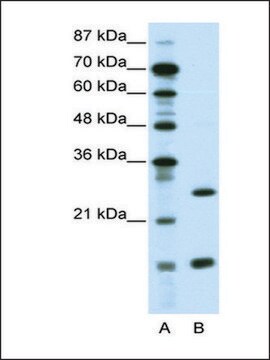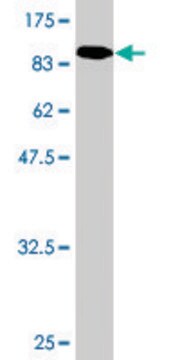MABE1018
Anti-BBF2H7/CREB3L2 Antibody, clone 28G9
clone 28G9, from mouse
Synonym(s):
Cyclic AMP-responsive element-binding protein 3-like protein 2, BBF2H7, cAMP-responsive element-binding protein 3-like protein 2/CREB3L2
About This Item
Recommended Products
biological source
mouse
Quality Level
antibody form
purified antibody
antibody product type
primary antibodies
clone
28G9, monoclonal
species reactivity
mouse, rat, human
technique(s)
immunocytochemistry: suitable
immunoprecipitation (IP): suitable
western blot: suitable
isotype
IgG1κ
NCBI accession no.
UniProt accession no.
shipped in
wet ice
target post-translational modification
unmodified
Gene Information
human ... CREB3L2(64764)
General description
Immunogen
Application
Epigenetics & Nuclear Function
Nuclear Receptors
Immunoprecipitation: A representative lot co-immunoprecipitated ER-associated E3 Ub ligase Hrd1 with BBF2H7/CREB3L2 from rat C6 glioma cells only before, but not after, ER stress induction by thapsigargin treatment (Kondo, S., et al. (2012). Cell Death Differ. 19(12):1939-1949).
Western Blottting Analysis: A representative lot detected BBF2H7/CREB3L2 upregulation in murine ATDC5 chondrogenic cells after siRNA-mediated Hrd1 knockdown, as well as BBF2H7/CREB3L2 upregulation in HeLa cells upon proteasome inhibition or ER stress induction (Kondo, S., et al. (2012). Cell Death Differ. 19(12):1939-1949.)
Immunocytochemistry: A representative lot detected enhanced ER & nuclear BBF2H7/CREB3L2 immunoreactivity in rat glioma C6 cells upon proteasome inhibitor MG132 treatment (Kondo, S., et al. (2012). Cell Death Differ. 19(12):1939-1949).
Quality
Western Blotting Analysis: 0.25 µg/mL of this antibody detected BBF2H7/CREB3L2 in 10 µg of rat C6 glioma cell lysate.
Target description
Physical form
Storage and Stability
Other Notes
Disclaimer
Not finding the right product?
Try our Product Selector Tool.
Storage Class Code
12 - Non Combustible Liquids
WGK
WGK 1
Flash Point(F)
Not applicable
Flash Point(C)
Not applicable
Certificates of Analysis (COA)
Search for Certificates of Analysis (COA) by entering the products Lot/Batch Number. Lot and Batch Numbers can be found on a product’s label following the words ‘Lot’ or ‘Batch’.
Already Own This Product?
Find documentation for the products that you have recently purchased in the Document Library.
Our team of scientists has experience in all areas of research including Life Science, Material Science, Chemical Synthesis, Chromatography, Analytical and many others.
Contact Technical Service








